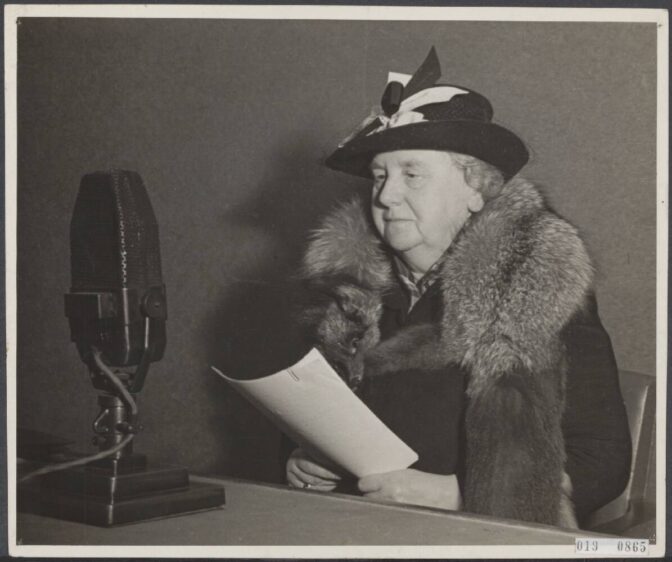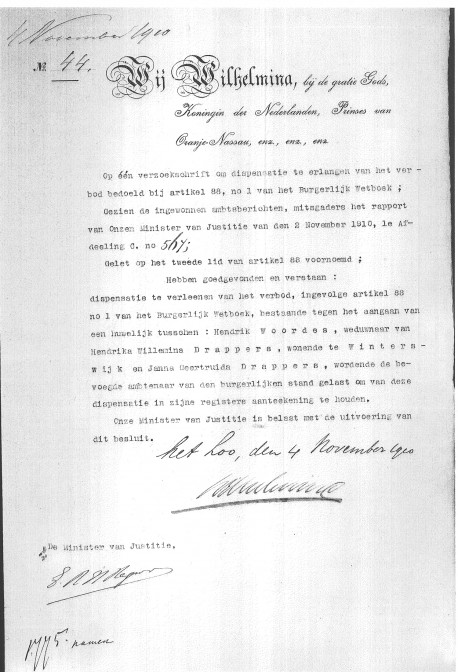A Royal Decree (Koninklijk Besluit) is a formal decision by the King or Queen. In the Netherlands, royal decrees started in 1813.

Queen Wilhelmina reading a proclamation, 1941. Credits: Collection Elsevier, Nationaal Archief (public domain)
Contents
Royal decrees covered a range of topics. Some were of (inter)national importance, such as treaties, laws, and abdications. But many dealt with individual citizens, employees, or service personnel. These can be a great source for information about your ancestors.
Examples of information about your ancestors you may find in royal decrees:
- Marriage dispensations, for example if a groom wanted to marry the sister of his late wife, like my great-grandparents Hendrik Woordes and Janna Geertruid Droppers.
- Naturalizations, like my ancestor Arend Kastein, who moved across the street that happened to be the border between Germany and the Netherlands and then had to be naturalized before he could become a police constable.
- Promotions and appointments of officers or civil servants
- Pensions of civil servants, which did not only include people working for the national government directly, but also many mailmen, teachers, etc.

Royal Decree giving permission to Hendrik Woordes and Janna Geertruid Drappers [sic] to be married
Finding a royal decree
Royal Decrees of the Kings and Queens of the Netherlands between 1813 and 1988 are kept at the National Archives in The Hague. They are organized by date and then by number.
There are different ways to find the date and number of a decree: via contemporary indexes or through references in other sources.
Contemporary indexes
The royal decrees have contemporary indexes. There are name indexes by year, that include names, places, organizations, or subjects. That index will give you a reference to the annual index. The annual index will give a description of the underlying documents and the date and number of the royal decree.
You can do this if you think there may be a decree, for example if you know your ancestor was a civil servant who retired that year, and would have had a pension. If you do not know the exact year, you will have to search multiple years.
Most contemporary indexes have been scanned. You can find them in the finding aids:
- 1813-1840: record group 2.02.01, call numbers 5156-5192 (name indexes), 5063-5153 (annual indexes)
- 1841-1897: record group 2.02.04, call numbers 3966-4022 (name indexes), 3843-3965 (annual indexes)
Other sources
You may find a reference in another source. For example, you may find an extract of a royal decree in the marriage supplements, if the bride and groom needed a dispensation to marry, or needed authorization to marry by proxy. Or you may find a newspaper announcement of the royal decree that mentions your ancestor.
Consulting the royal decree
Once you know the date and number of the decree, you can look up the call number in the finding aid. Often, the decree itself has not been scanned yet. You can consult the decree in the reading room of the National Archives or order a scan via the paid scanning-on-demand service. Please mention the date and number in the description.
- 1813-1840: record group 2.02.01, call numbers 1-4656
- 1841-1897: record group 2.02.04, call numbers 1-3500
- 1898-1945: record group 2.02.14, call numbers 4551-7521, 8175-8603, 9034-9078
- 1946-1975 record group 2.02.20, call numbers 9401-13156
- 1976-1988: record group 2.02.30, call numbers 14000-16388
Dutch Genealogy source score
 Amount of information about births, marriages, deaths
Amount of information about births, marriages, deaths
 Amount of background information about your ancestors
Amount of background information about your ancestors
 Online availability of scans
Online availability of scans
 Online availability of indexes or transcriptions
Online availability of indexes or transcriptions
 Easy to understand if you don’t know Dutch
Easy to understand if you don’t know Dutch


Very interesting article, Yvette. Thank you .
What a cool resource!!!